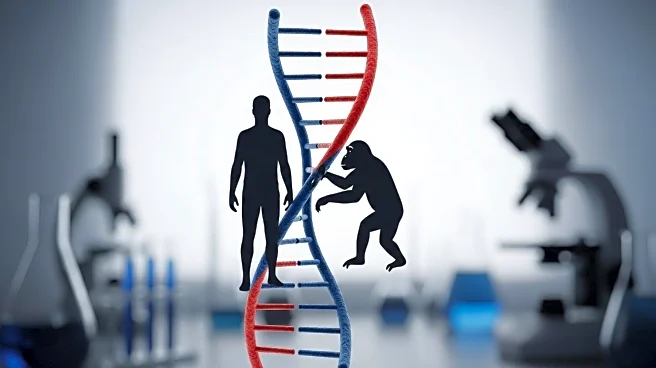What's Happening?
Recent scientific analysis challenges the commonly cited statistic that humans and chimpanzees share 98.8% of their DNA. Experts have pointed out that this figure overlooks significant differences in the genomes of the two species. Human and chimp DNA consists of four nucleotides: adenine, guanine, cytosine, and thymine. When comparing these genomes, scientists look for overlapping sequences and count matching nucleotides. However, this method does not account for sections of DNA that are difficult to compare, such as insertions and deletions, which can make up 15% to 20% of the genome. A study conducted in 2025 found that when these complex regions are included, the genetic difference between humans and chimps could exceed 10%. The differences are primarily found in noncoding DNA, which does not code for proteins but regulates gene expression, leading to significant differences in traits.
Why It's Important?
Understanding the genetic differences between humans and chimpanzees is crucial for evolutionary biology and medical research. The findings highlight the complexity of genetic comparisons and the importance of noncoding DNA in determining species-specific traits. This research could impact studies on human evolution, genetic diseases, and the development of therapies targeting gene expression. By recognizing the broader genetic differences, scientists can better understand the evolutionary processes that have shaped humans and their closest relatives. The study also underscores the need for advanced technologies to accurately compare complex genomic regions, which could lead to more precise genetic mapping and insights into human health.
What's Next?
Future research may focus on further exploring the noncoding regions of the genome to understand their role in gene regulation and expression. Scientists might develop new technologies to better align and compare complex genomic regions, potentially leading to breakthroughs in genetic research. Additionally, this study could prompt a reevaluation of genetic similarity metrics used in evolutionary biology, influencing how researchers approach comparative genomics. As technology advances, more accurate comparisons could provide deeper insights into the genetic basis of human traits and diseases, paving the way for innovative medical treatments.
Beyond the Headlines
The study raises ethical and philosophical questions about the nature of genetic similarity and its implications for understanding human identity and evolution. It challenges the simplistic view of genetic overlap and encourages a more nuanced perspective on the relationship between humans and other species. This could influence discussions on biodiversity conservation and the ethical treatment of animals, as well as inform public policy on genetic research and its applications.








